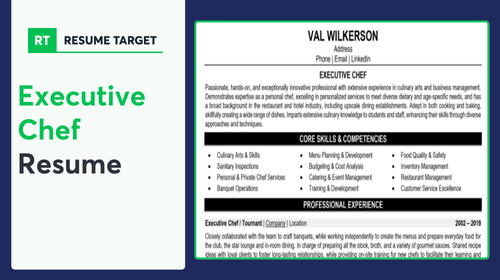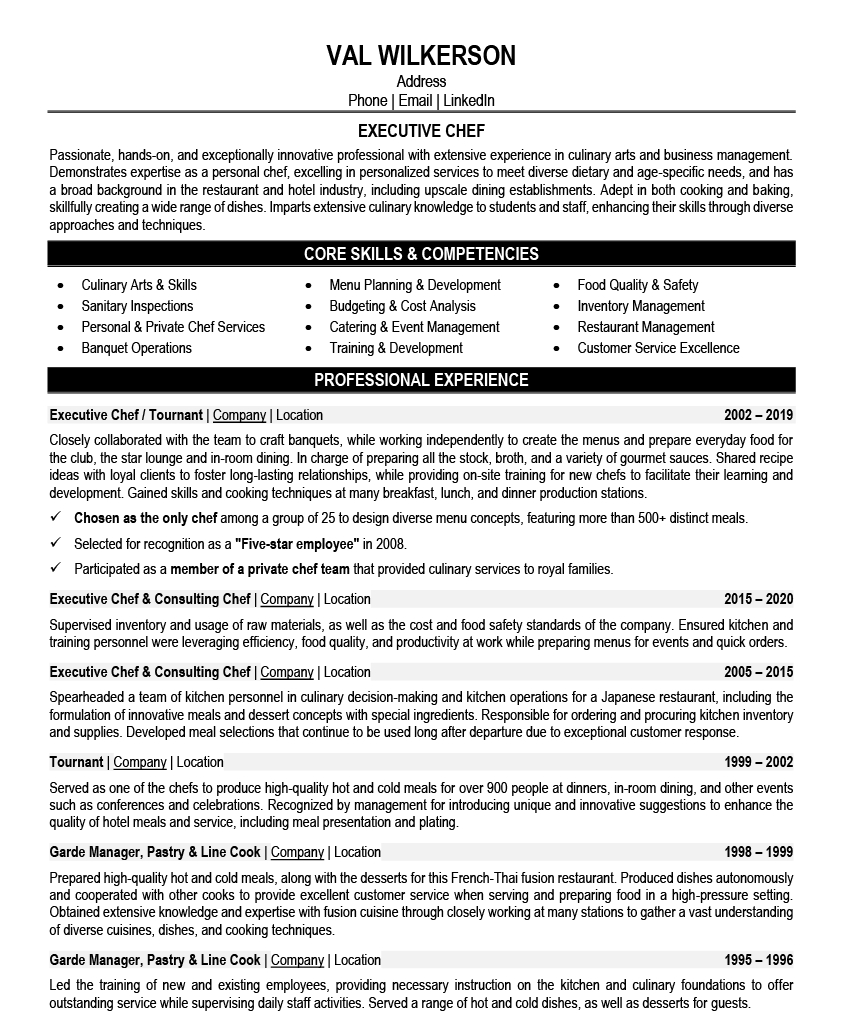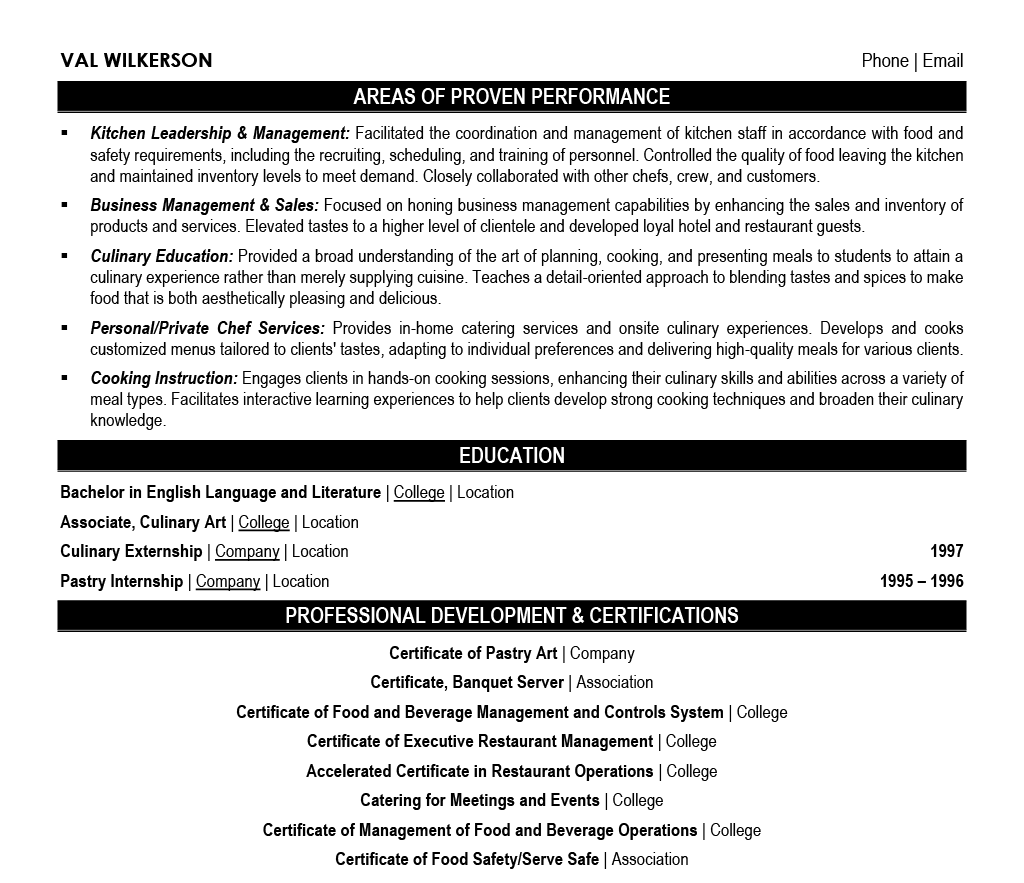

Turning ingredients into amazing dishes is your talent, but turning your kitchen experience into an impressive resume can feel impossible. Many cooks struggle to describe their culinary skills in a way that catches a hiring manager's eye.
Are you finding it hard to stand out in a crowded field of culinary professionals? Your resume needs to showcase both your technical cooking abilities and your impact on restaurant operations. A well-crafted resume can move you from the back burner to the top of the interview list.
At Resume Target, we help cooks translate their kitchen expertise into powerful career documents. We know how to present your culinary achievements and operational skills in language that resonates with restaurant managers and executive chefs.


As the commanding officer of professional kitchens, Executive Chefs orchestrate culinary operations that serve thousands of guests each week, managing everything from menu design and food purchasing to staff training and kitchen coordination.
Your role as an Executive Chef extends far beyond cooking, requiring you to blend creative culinary expertise with sharp business acumen as you lead kitchen teams, maintain food quality standards, and ensure both customer satisfaction and profitable operations.
Whether you're currently working the line or dreaming of running your own kitchen, the path to becoming an Executive Chef offers exciting opportunities to develop both your culinary mastery and leadership abilities, transforming your passion for food into a rewarding career at the helm of professional kitchens.
Let's talk about what's exciting in the culinary world - your earning potential as an Executive Chef continues to grow! From prestigious restaurants to luxury hotels, your expertise in leading kitchen operations and creating innovative menus can command impressive compensation packages that reflect your culinary mastery and leadership skills.
Figures from: White Carrot
The path to becoming an Executive Chef starts with hands-on kitchen experience and builds through dedication to culinary excellence. Your journey combines practical skills, leadership development, and continuous learning to reach the top of the kitchen hierarchy.
Success in the culinary world requires mastering both the art of cooking and the science of kitchen management.
- Advanced culinary techniques and menu development - Kitchen operations and workflow optimization - Financial management and cost control - Leadership and team developmentThe journey to becoming an Executive Chef typically begins with culinary school or apprenticeship, followed by progressive kitchen experience that builds both cooking expertise and leadership abilities.
To advance through kitchen ranks, you'll need to develop essential skills including leadership and mentoring abilities, which you can start building from your very first kitchen position.
• Line Cook • Sous Chef • Chef de Partie • Junior Sous Chef • Senior Sous Chef • Executive Sous Chef • Executive ChefCommon entry points include: • Culinary school graduate • Kitchen apprentice • Prep cook • Commis chef
Advancement timeline: • Line cook: 1-2 years • Sous chef positions: 3-5 years • Executive sous chef: 2-3 years • Executive chef: 8-15 years total experience
Requirements from American Culinary Federation
From bustling restaurants in NYC to luxury resorts in Florida, Executive Chef opportunities span hospitality hotspots nationwide.
Figures from U.S. Bureau of Labor Statistics
Struggling to distill years of culinary expertise, kitchen management, and menu innovation into a compelling resume that catches a hiring manager's eye? This comprehensive, section-by-section guide will help you craft a professional executive chef resume that showcases your culinary leadership and achievements.
As a culinary professional who can effortlessly create stunning dishes and manage kitchen operations, you might find it challenging to put your diverse talents into words on paper.
While you excel at crafting menus, leading kitchen teams, and maintaining food costs, translating these complex skills into a compelling summary that catches a restaurant owner's or hospitality director's attention requires a different kind of recipe for success.
How would you characterize your culinary leadership philosophy and its impact on kitchen operations across your career?
Reason: This helps establish your high-level approach to kitchen management and team development, setting the tone for your executive-level capabilities rather than individual accomplishments.
What unique combination of culinary traditions, business acumen, and hospitality expertise defines your value as an Executive Chef?
Reason: This question helps synthesize your broad skill set into a compelling value proposition that speaks to both the artistic and commercial aspects of executive-level culinary leadership.
How have you evolved your approach to menu development, food cost management, and kitchen innovation throughout your career progression?
Reason: This prompts you to articulate your strategic thinking and adaptability in key executive chef responsibilities, helping craft a summary that demonstrates comprehensive industry expertise.
As an Executive Chef, your resume needs to showcase both your culinary expertise and leadership abilities, from menu development and food cost management to kitchen staff supervision and vendor relations.
Your skill set should reflect a balance between hands-on cooking mastery (like advanced knife skills and sauce preparation) and operational competencies (such as inventory control and health code compliance), demonstrating your ability to excel in both the creative and business aspects of running a professional kitchen.
Showcase your culinary leadership journey by organizing your experience into three powerful sections: your role overview highlighting kitchen management scope, your measurable achievements in menu innovation and team development, and your core responsibilities demonstrating operational excellence.
Many Executive Chefs struggle to translate their daily kitchen operations and culinary innovations into compelling business metrics that resonate with hiring managers. Transform your culinary accomplishments into powerful success stories by connecting your kitchen leadership to revenue growth, cost reduction, and operational excellence metrics that showcase your business acumen.
The responsibilities section demonstrates how Executive Chefs lead kitchen operations beyond basic cooking tasks. This section must translate complex culinary management into clear achievements that hiring managers can understand, showing how your leadership directly impacts restaurant success and profitability.
Your culinary education and professional certifications demonstrate your expertise and commitment to culinary excellence. List your most prestigious certifications first, such as your Certified Executive Chef (CEC) credential, followed by formal culinary education and specialized certifications in food safety and management.
Now that you've crafted a strong foundation for your culinary resume using our expert guidelines, it's time to transform it into a powerful tool that speaks directly to each unique kitchen opportunity.
While many chefs focus solely on customizing their cover letters, tailoring your resume for specific Executive Chef positions is crucial for showcasing your exact match with each restaurant's unique culture, cuisine style, and operational needs.
A customized Executive Chef resume not only helps you navigate through ATS systems scanning for specific culinary keywords and experiences, but it also demonstrates to hiring managers that you understand their specific kitchen requirements and can deliver exactly what they're looking for in their next culinary leader.
Ready to turn your resume into your secret ingredient for success? Let's make your experience sizzle with targeted customization that will have top restaurants competing for your talents!
Don't let a lack of professional kitchen experience hold you back from pursuing your culinary dreams! Your journey to becoming an Executive Chef can start with highlighting your culinary education, fundamental cooking techniques, and hands-on experience from internships or staging opportunities.
Focus on showcasing your knowledge of kitchen operations, menu development skills, and food safety certifications in your resume. For more guidance on crafting the perfect culinary resume, check out our Student Resume Writing Guide to help you present your skills in the most appetizing way.
Your culinary education and hands-on kitchen experience are powerful assets that deserve to shine in your resume summary, even without years of executive experience.
Focus on showcasing your technical cooking expertise, leadership potential, and passion for culinary excellence to create an impactful first impression.
"Dedicated and creative culinary professional with 3+ years of progressive kitchen experience and formal training from Le Cordon Bleu. Demonstrated expertise in menu development, kitchen operations, and team leadership through successful internships at Michelin-starred restaurants. Proficient in classical French techniques, modern gastronomy, and food cost management. Seeking Executive Chef position to leverage strong culinary foundation and innovative approach in delivering exceptional dining experiences."
Now's your chance to showcase the culinary training and hands-on experience that shaped your expertise in the kitchen!
Don't just list your culinary school diploma - highlight specialized courses like Advanced Pastry Arts or Global Cuisines, and feature signature projects like managing a pop-up restaurant or creating an original tasting menu that demonstrates your creative and technical mastery.
The courses common to a Certified Executive Chef (CEC) certification include Nutrition, Food Safety & Sanitation, Supervisory Management, Beverage Management, and Cost Control Management [1].Relevant Coursework: Nutrition | Food Safety & Sanitation | Supervisory Management | Beverage Management | Cost Control Management | Menu Planning & Development
Key Projects:
Farm-to-Table Menu Innovation Project: Led the development and implementation of a seasonal menu featuring locally-sourced ingredients, resulting in a 30% reduction in food costs while elevating dining experience.
Kitchen Operations Efficiency Initiative: Streamlined kitchen workflow and inventory management systems to improve service times and reduce waste in a high-volume setting.
Transform your culinary education, kitchen experience, and technical expertise into a compelling skills section that showcases your readiness to lead a professional kitchen team and create exceptional dining experiences.
As an aspiring Executive Chef, highlighting these foundational skills demonstrates your potential to advance from line cook or sous chef positions into higher leadership roles, where you'll have the opportunity to shape culinary programs and inspire kitchen teams.
Let's be honest - capturing your culinary creativity, leadership abilities, and operational expertise on paper feels about as easy as perfectly timing a 12-course tasting menu during peak service.
At Resume Target, we speak the language of hospitality and understand the unique challenges executive chefs face in today's competitive culinary landscape.
Our expert writers have helped countless culinary leaders transform their experiences - from kitchen management to menu innovation - into compelling stories that land interviews at top establishments.
With the hospitality industry's hiring season ramping up, now is the perfect time to ensure your resume matches your culinary excellence - let's start crafting your standout resume today.
Impress any hiring manager with our Hospitality resume writing service. We work with all career levels and types of Hospitality professionals.
Learn More → Hospitality Resume Writing Services